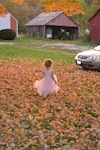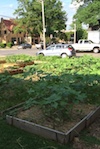The watering came in unexpected ways. Sometimes the Lord’s refreshing comes through a change of scenery — the resting place of a vacation, a Sabbath day of ceasing our worry and work, a retreat at Laity Lodge. Sometimes it comes through a change of countenance — we are literally righted from the inside out, brought to clarity, given new perspective and strength. Sometimes we’re made compassionate again, given a new imagination and concern for people’s needs, or a renewed sense of meaning and purpose.
All in Truth
 For me, the empty pages tell the story of my life becoming occupied with things I never suspected would lead me from the corner booth at the coffee shop into the consuming risk and mess and joy and inertia of marrying a woman who beckons me out of isolation, of raising four beautiful and uniquely complex children, of moving from one city to another, of living in a community, and of following a vocation which, ironically, involves more writing than ever.
For me, the empty pages tell the story of my life becoming occupied with things I never suspected would lead me from the corner booth at the coffee shop into the consuming risk and mess and joy and inertia of marrying a woman who beckons me out of isolation, of raising four beautiful and uniquely complex children, of moving from one city to another, of living in a community, and of following a vocation which, ironically, involves more writing than ever.
 Most days of the year, I wear worn blue jeans, a soft grey T-shirt, and old tennis shoes — a sharp contrast to my derby attire. I like grey: it suits my personality and my desire to keep things safe and simple. But looking back on my collective experiences, I recognize there is a hot-pink narrative thread that runs throughout my story, stringing together all of the things that thrill me most in this world. It connects me to an adventure that is more exciting than one I have envisioned for myself.
Most days of the year, I wear worn blue jeans, a soft grey T-shirt, and old tennis shoes — a sharp contrast to my derby attire. I like grey: it suits my personality and my desire to keep things safe and simple. But looking back on my collective experiences, I recognize there is a hot-pink narrative thread that runs throughout my story, stringing together all of the things that thrill me most in this world. It connects me to an adventure that is more exciting than one I have envisioned for myself.
 In this world where news of torture and death runs like a ticker through my day, I’m realizing in a new way that I must learn to pray. I must learn to sit in silence with a God who is all-powerful and all-loving in the mystery of horrendous suffering. I must learn to lift up my sisters and brothers without ceasing. I must learn to pray ordinary prayers for them in my small way and believe that God makes those prayers matter.
In this world where news of torture and death runs like a ticker through my day, I’m realizing in a new way that I must learn to pray. I must learn to sit in silence with a God who is all-powerful and all-loving in the mystery of horrendous suffering. I must learn to lift up my sisters and brothers without ceasing. I must learn to pray ordinary prayers for them in my small way and believe that God makes those prayers matter.
 There is a tension here that my husband and I find important as parents. As our life on a farm begins to mirror the lives of some of our ancestors who had closer connections to death, food, seasons, and the rhythm of days, our family has been given many opportunities to experience both a spiritual and a literal darkness that cannot be eliminated. We try not to shield our children from every hurt and pain. But we also encourage them in their imaginations, giving them a framework for hope and allowing them to “escape into” the longing for the not-yet that literature can bring.
There is a tension here that my husband and I find important as parents. As our life on a farm begins to mirror the lives of some of our ancestors who had closer connections to death, food, seasons, and the rhythm of days, our family has been given many opportunities to experience both a spiritual and a literal darkness that cannot be eliminated. We try not to shield our children from every hurt and pain. But we also encourage them in their imaginations, giving them a framework for hope and allowing them to “escape into” the longing for the not-yet that literature can bring.
 I watch the world through tinted glass — and often don’t really see it. I close the windows to control the climate and keep the gnats — and the world — at a distance. I drive past the same homeless woman walking our sidewalks several times a week, and have I ever stopped the car to chat? Only twice in nine years. My car is large and strong, and it insulates me from the world like an armored vehicle.
I watch the world through tinted glass — and often don’t really see it. I close the windows to control the climate and keep the gnats — and the world — at a distance. I drive past the same homeless woman walking our sidewalks several times a week, and have I ever stopped the car to chat? Only twice in nine years. My car is large and strong, and it insulates me from the world like an armored vehicle.
 I am always seeking to hone my technique, to generate new and creative ideas, to find a different way of looking at the world. But like the construction workers, I have to build on what’s already there. I have to strike a balance, uneasy though it may be, of honoring the strength of the old, and creating a little chaos to bring in the new.
I am always seeking to hone my technique, to generate new and creative ideas, to find a different way of looking at the world. But like the construction workers, I have to build on what’s already there. I have to strike a balance, uneasy though it may be, of honoring the strength of the old, and creating a little chaos to bring in the new.
 I could probably find a way to heat treat everything else as well. Not only my food, but my home and my relationships. I could boil my garden vegetables, throw money at my old house, distance myself from friends and family and neighbors. I could fence my children in with a hundred thousand rules.
I could probably find a way to heat treat everything else as well. Not only my food, but my home and my relationships. I could boil my garden vegetables, throw money at my old house, distance myself from friends and family and neighbors. I could fence my children in with a hundred thousand rules.
Then they would be safe. Then they would be contained. Then they would no longer have the power to break my heart.
 So far, I’d only added dirt, bone meal, and periodic water, then parked the cans in a sunny spot to see what happened. Yet thanks to this minimal work, green shoots were already seeking the sun, requiring me to add almost daily scoops of more dirt to cover the rapidly growing stems. Water plus dirt made mud in most other settings, but here were these plants, charting almost miraculous growth despite so little work on my part.
So far, I’d only added dirt, bone meal, and periodic water, then parked the cans in a sunny spot to see what happened. Yet thanks to this minimal work, green shoots were already seeking the sun, requiring me to add almost daily scoops of more dirt to cover the rapidly growing stems. Water plus dirt made mud in most other settings, but here were these plants, charting almost miraculous growth despite so little work on my part.
Maybe I grew like that too.
 And then, for the first (of many) profoundly healing moments of the weekend, I realized that I was temporarily untethered. But not untethered in the Sandra-Bullock-out-in-space sort of way. Instead of feeling distress or loneliness, I felt an unfamiliar sensation that it was just me here. I remembered that I exist. Not only that, but I felt relieved and surrounded by the acceptance of God. Nobody calling. Nobody for me to check on or take care of. No Twitter feed. No e-mails waiting with exclamation points.
And then, for the first (of many) profoundly healing moments of the weekend, I realized that I was temporarily untethered. But not untethered in the Sandra-Bullock-out-in-space sort of way. Instead of feeling distress or loneliness, I felt an unfamiliar sensation that it was just me here. I remembered that I exist. Not only that, but I felt relieved and surrounded by the acceptance of God. Nobody calling. Nobody for me to check on or take care of. No Twitter feed. No e-mails waiting with exclamation points. Sabbath-keeping is a sturdy axis when the storms of life threaten spring’s hope. The choice of rest when responsibilities pile up seems counterintuitive, yet carving out routine time periods with the Creator provides a steady center while life continues spinning.
Sabbath-keeping is a sturdy axis when the storms of life threaten spring’s hope. The choice of rest when responsibilities pile up seems counterintuitive, yet carving out routine time periods with the Creator provides a steady center while life continues spinning.
It is when we cannot control outcomes that the depth and breath of trust becomes revelation.
 It was in rereading the poems, though, that the poetry got left behind. I started reading these poems as prayers. And not prayers of the animals, but prayers for myself. These are prayers I would never know how to say, for the creature-like movements inside of me are intrinsically inarticulate. These poems are prayers for the animals inside of us — the heavy, slow, frightful, instinctive — those parts of us that fly and plod and bury down.
It was in rereading the poems, though, that the poetry got left behind. I started reading these poems as prayers. And not prayers of the animals, but prayers for myself. These are prayers I would never know how to say, for the creature-like movements inside of me are intrinsically inarticulate. These poems are prayers for the animals inside of us — the heavy, slow, frightful, instinctive — those parts of us that fly and plod and bury down.
 When I saw my garden plot I was surprised at the way it seemed both small and large.
When I saw my garden plot I was surprised at the way it seemed both small and large.
I got to spot the blossom first. Judy first spotted the cluster of green cherry tomatoes, and texted me a photo. I look forward to watching their reddening, and to the day of harvest, to that first burst of pure sunlight in my mouth. But the yield is not high in my goals. Neither, any more, is the work of emptying my mind and dirtying my fingernails.
My primary goal in sharing this garden is to yield to the Overseer’s soul amendments.
Becoming a Songwriter, Part 3
Whether you believe you have a soul, a personality, or that you are a random blip in a succession of universes, within your person is the very you of you. I’m describing the you that is only you and no one else on the planet. You know you’re not me or your sister or brother. You are you. You have a mind and emotions that feel, think, and imagine. You have a body that has mobility and senses. You have a gender. You’re able to communicate in a number of ways — non-verbally through expressions, with language, with your whole body, and of course with music. Creativity, and specifically songwriting, ought to be the natural outworking of the whole person simply being what he or she is, human.
 In that first class all I could think about were Madonna’s biceps. It was the late 1990s, and Madonna had recently become as famous for her toned physique (attributed to her recent interest in yoga) as for her music. As I looked at myself in the mirror of the studio, awkwardly trying to follow the instructor’s gentle guidelines, I wondered if Madge’s muscle tone would be a happy by-product of my journey into health. “Bring your attention to the breath,” the instructor said, while gently lifting my hips, which were already trembling from exertion. Madonna, her biceps, and my own body scampered away from my attention, as I shifted that attention to my breath. Inhale. Exhale. Inhale. Exhale. On my way home on the subway, faced with the mild anxiety that always seemed to accompany me into cramped spaces, I tried to do the same. Inhale. Exhale. Inhale.
In that first class all I could think about were Madonna’s biceps. It was the late 1990s, and Madonna had recently become as famous for her toned physique (attributed to her recent interest in yoga) as for her music. As I looked at myself in the mirror of the studio, awkwardly trying to follow the instructor’s gentle guidelines, I wondered if Madge’s muscle tone would be a happy by-product of my journey into health. “Bring your attention to the breath,” the instructor said, while gently lifting my hips, which were already trembling from exertion. Madonna, her biceps, and my own body scampered away from my attention, as I shifted that attention to my breath. Inhale. Exhale. Inhale. Exhale. On my way home on the subway, faced with the mild anxiety that always seemed to accompany me into cramped spaces, I tried to do the same. Inhale. Exhale. Inhale.
 By sheer will, I managed to remain horizontal, feet obediently planted firmly on the wall of rock. While gaining a small victory over the battle waging within, I remembered the young girl who was dangling on a rope beside me. Surely, she must be terrified. To be helpless, at the mercy of another, and to be unable to see seemed unimaginable. She was completely vulnerable.
By sheer will, I managed to remain horizontal, feet obediently planted firmly on the wall of rock. While gaining a small victory over the battle waging within, I remembered the young girl who was dangling on a rope beside me. Surely, she must be terrified. To be helpless, at the mercy of another, and to be unable to see seemed unimaginable. She was completely vulnerable.
Yet she was smiling. And laughing.
 When we tell our struggle and pain and joy and even what makes us laugh, we know more deeply who we are. And we know more deeply who each other is. We all need listeners, intellectual stretchers, confidants, energetic people, angels, spiritual guides, and helpers in our lives. Because we need belonging. It is difficult to create an environment of belonging for a child if you don’t feel like you belong anywhere. So find someone who listens, and tell your story. Let yourself be known. Once you have a powerful sense of belonging, you can’t help but begin to create that wherever you are.
When we tell our struggle and pain and joy and even what makes us laugh, we know more deeply who we are. And we know more deeply who each other is. We all need listeners, intellectual stretchers, confidants, energetic people, angels, spiritual guides, and helpers in our lives. Because we need belonging. It is difficult to create an environment of belonging for a child if you don’t feel like you belong anywhere. So find someone who listens, and tell your story. Let yourself be known. Once you have a powerful sense of belonging, you can’t help but begin to create that wherever you are.
 Once a week they arrive at our church. We sit them down at a table with us, one by one, our guests, longing to be Jesus to them, to assist in the miracles of change by the power of His Spirit. Their poverty is immediate and unmediated. We are eye to eye, hand to hand with them. There is no mistaking the grime on the skin, the stink of the unwashed, the flush of fever, the glazed eyes of the whacked out. This is no abstraction, no theoretical sociological condition. They are marked indelibly by their deprivation. They want a life for themselves and for their children, but where can it be? The sense of the impossible overwhelms them.
Once a week they arrive at our church. We sit them down at a table with us, one by one, our guests, longing to be Jesus to them, to assist in the miracles of change by the power of His Spirit. Their poverty is immediate and unmediated. We are eye to eye, hand to hand with them. There is no mistaking the grime on the skin, the stink of the unwashed, the flush of fever, the glazed eyes of the whacked out. This is no abstraction, no theoretical sociological condition. They are marked indelibly by their deprivation. They want a life for themselves and for their children, but where can it be? The sense of the impossible overwhelms them.
 It is slightly possible that the world needs calculating over-thinkers like me to help them see just as much as we grim curmudgeons need light-hearted souls to help us see and remember to breathe. As with dancing, some things are better left to more carefree, exuberant night owls. For my part, I hope to learn to gently move through the achy breaky friction of stress and near-falling apart in order to participate in my own idiosyncratic dance of sorts: one of genuine levity and introspection, delighting in motion and the way living and dying dance and wait on one another.
It is slightly possible that the world needs calculating over-thinkers like me to help them see just as much as we grim curmudgeons need light-hearted souls to help us see and remember to breathe. As with dancing, some things are better left to more carefree, exuberant night owls. For my part, I hope to learn to gently move through the achy breaky friction of stress and near-falling apart in order to participate in my own idiosyncratic dance of sorts: one of genuine levity and introspection, delighting in motion and the way living and dying dance and wait on one another.
The Troughs
Troughs are crucial seasons in the life of faith, revealing the rotting, lesser crutches on which we depend, conditioning our spiritual muscles, and nurturing our hope in heaven. Sorrow and suffering produce immense spiritual momentum. Grasping their hands as traveling companions, like Much Afraid in Hannah Hurnard’s time-honored allegory Hinds’ Feet on High Places, strengthens our stride over time. Rejecting them produces bitterness and strain, because the troughs will find us, whether or not we look for them.

















